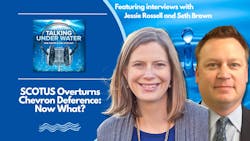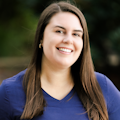SCOTUS overturns Chevron deference: Now what?
In June, the United States Supreme Court overturned a 40-year-old precedent called “Chevron deference” in the “Loper Bright Enterprises v. Raimondo” case. Chevron deference essentially meant that in cases where interpretation of a law developed by Congress was grey the courts would yield their decisions to the primacy agency in charge of enforcing the law. With this latest ruling, deference will not be given to those agencies, however, and the courts will be the ones to decide the outcome.
To better understand the impact this might have on the water industry, this episode features two interviews. In the first, Co-host Bob Crossen spoke with Jessie Rosell, a partner in Lathrop GPM's PFAS practice, about the impacts of Chevron on PFAS regulations and how the regulatory process may shift and change in the wake of his latest Supreme Court ruling. In the second interview, Co-host Katie Johns spoke with Seth Brown, executive director for the National Municipal Stormwater Alliance, about the impacts he anticipates seeing and what it means for the water sector.
Show Notes:
- The future of regulatory authority – and how this may impact the stormwater sector
- Supreme Court Rulings Challenge EPA Authority, Sparking Environmental Concerns
- EPA designates PFOA and PFOS as hazardous substances under CERCLA
- What do the new PFAS MCLs mean for the water industry?
From Endeavor Business Media
- Chevron deference is gone. What does that mean for trucking? - Fleet Owner
- SCOTUS limits power of federal government to regulate environmental, energy issues - Oil & Gas Journal
Timestamps:
- Introduction and episode summary: 0:08
- Overview of Chevron deference with Jessie Rosell | 1:46
- The thrust of the original Chevron decision | 3:00
- Impacts of Chevron's overturn on PFAS regulations | 3:52
- Challenges to the PFAS MCLs | 5:48
- How the reversal of Chevron impacts regulation promulgation | 7:24
- More involved Congressional hearings for effective law-making |9:37
- Are lower courts prepared for this case load? | 10:32
- How uncertainty creates delays | 12:33
- Chevron deference context with Seth Brown | 13:39
- How Chevron will impact the water sector | 17:02
- Loss of Chevron and insonsistent legal rulings | 23:10
- Local and regional regulatory patchwork | 26:17
- Chevron overturn impacts future regulations, not past ones | 30:38
- Housekeeping | 34:09
Resources:
Build America, Buy America eHandbook
About the Podcast
Talking Under Water is the premier podcast for the water industry, including municipal and industrial water and wastewater, residential water treatment, storm water management and erosion control. It is produced in coordination between Wastewater Digest (WWD), WaterWorld and Storm Water Solutions (SWS). The podcast covers topics under the One Water movement including the municipal and industrial water and wastewater, point of use, point of entry, residential, storm water and erosion control markets. Talking Under Water highlights news, trends, new technologies, industry discussions and on-site interviews with experts for WWD, WW and SWS. New episodes of the podcast are released on the third Friday of every month. Logo Images: Anatoly Tiplyashin / Romolo Tavani / stock.adobe.com.
Contact the Talking Under Water podcast editors by emailing [email protected] engaging with them on Twitter @TUWpodcast. Join the conversation by commenting or using the hashtag #talkingunderwaterpod on social media.
About the Author
Katie Johns
Katie Johns, editor-in-chief of Storm Water Solutions and Water Quality Products, graduated from the University of Missouri in 2016 with a Bachelor of Journalism and a Bachelor of Arts in Spanish. Johns joined the Storm Water Solutions team in September 2019. Johns also helps plan the annual StormCon conference and co-hosts the Talking Under Water podcast. Prior to entering the B2B industry, she worked as a newspaper reporter and editor in Sarasota, Florida, and a magazine assistant editor in the Chicago suburbs. She can be reached at [email protected]
Bob Crossen
Bob Crossen is the vice president of content strategy for the Water and Energy Groups of Endeavor Business Media, a division of EndeavorB2B. EB2B publishes WaterWorld, Wastewater Digest and Stormwater Solutions in its water portfolio and publishes Oil & Gas Journal, Offshore Magazine, T&D World, EnergyTech and Microgrid Knowledge in its energy portfolio. Crossen graduated from Illinois State University in Dec. 2011 with a Bachelor of Arts in German and a Bachelor of Arts in Journalism. He worked for Campbell Publications, a weekly newspaper company in rural Illinois outside St. Louis for four years as a reporter and regional editor. Crossen can be reached at [email protected].


